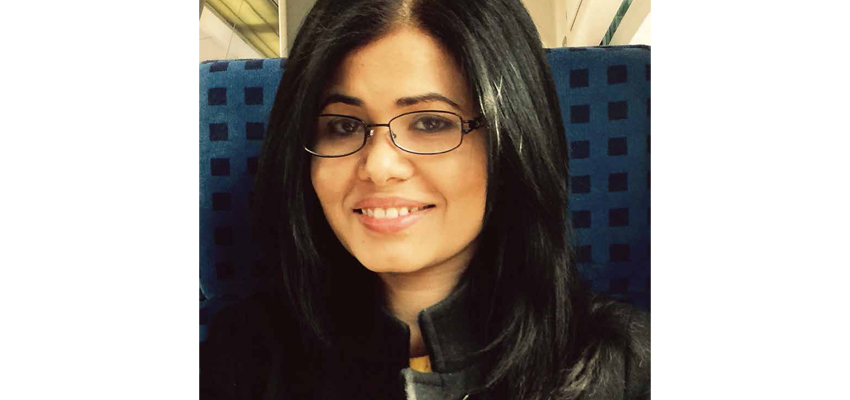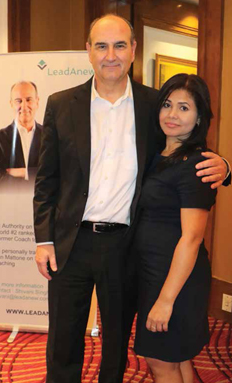The Art of Unlocking Leadership Performance

Developing leaders, who can lead in a world of disruptions comprising accelerating technologies, changing workforce models and employee preferences, is one of the most pressing issues organisations face today. Companies are now taking action by turning to executive leadership coaches who focus on how to effectively help CEOs and top executives in the transition, transformation and change. Calling it an art, Shivani Singh, Founder, LeadAnew, explains the benefits of executive leadership coaching
What is executive leadership coaching?
Executive leadership coaching is a very unique way of learning for executives and leaders. In a world of disruption, new ways of doing things have become the mandate. Basically, what leaders know today and how they do what they do today is no longer needed for tomorrow. In such a situation, leaders must not just learn what to do next, but, more importantly, ‘learn how to learn’ new things in every new kind of situation.
An executive leadership coach encourages the learner to learn for him/herself. Acquiring new job competencies, the learner gradually develops new and more effective learning skills. He/she becomes a proactive learner, capable of learning from almost any experience encountered. Executive leadership coaching is that critical process that helps leaders to gain self-awareness, goal clarity and plan the next steps to succeed in the future by resolving complex business issues. This form of learning is deeper and more sustaining than any other learning that is taught.
What are the top reasons that executive leadership coaches are engaged?
That’s a million-dollar question—there is no one size fits all formula when it comes to the needs of humans. Broadly, executive coaches can either be engaged for some ‘change need’, wherein an executive’s skill or behavior needs refocus or for ‘growth need’, where a high potential or recently promoted executive is facilitated to accelerate his/her learning curve. The main reasons for hiring coaches within these categories could be:
- Developing digital/transformation mindset leading through times of disruption.
- To help leaders resolve intrapersonal and interpersonal conflict for enhancing their leadership influence.
- Improving chances of early success for recently promoted executives.
- To help correct behavioral or value-based problems at the management level.
- Developing leadership skills in high potential executives.
- To develop management and leadership skills among top technical people.
What problems can executive coaching solve?
Today, the most pressing problem for executives is time and irrelevance of know-hows. They are so occupied by pressing business needs and mounting complexities that they are unable to find time to step back, reflect and refocus on their development as a ‘New Age’ leader. Most executives today are baffled by the disruptive business climate, not knowing how to take their organisations ahead or their own progress forward. And, this is where an executive coach adds tremendous value by being a sounding board; challenging them to build new perspectives and being that enabler of change.
Does executive coaching also help executives deal with time management issues so they can priorities their work strategically- thereby making them proactive rather than reactive?
Absolutely. Increasingly, coaching is not just about influencing leader’s behavior but also about helping executives with solutions to manage their time effectively, think clearly and strategically and also to navigate current business complexities.
How does one choose the right executive coach?
Working with an executive coach is a personal and developmental experience. Therefore, it’s important to take the time to find and choose the right coach. Also, you do not need a ‘yes’ person as your coach. Your coach should know how to best utilise your talents and work on your shortcomings in order to help you reach your goals.
Firstly, when meeting with prospective coaches to consider the possibilities of working together, it is important to find out how easily you are able to let them into your world. Gauge your chemistry with your prospective coach. Do they just cajole you or do they also challenge you?
Secondly, transformations and changes in attitudes, behaviors and mindsets can be very intimidating not just for you but also for your coach. So, one needs to know, whether she or he displays that courage to navigate that path with you?
Thirdly, assess your prospective coach’s skills and expertise, go through their testimonials and references. Find someone with the background you need and see if they have the depth to understand your world-either through their work or through their experience of having coached individuals in similar roles.
What are the ingredients of a successful coaching relationship?
The coach-coachee relationship is best described as a partnership based on trust, which includes clear communication of the boundaries of confidentiality, conscientiousness and the creation of a safe environment to speak openly and take risks; transparency, ownership and accountability. Also, it is important for the coach to support the client without judgment.
For organisations to flourish, what kind of mindset should leaders follow?
Today’s business environment is constantly evolving and the challenges businesses face cannot be resolved by just one individual. In order to flourish in such a business climate, one needs to break the mould and embrace the wider ecosystem.
Business leaders need to be fluid and find a way to collaborate, not just within their organisations but also with external partners and consumers. They must explore collaborations with competitors as well.
A leader who demonstrates and sustains a ‘Future First’ mindset stands a fair chance of taking their organisations to a higher level.
Would you agree that women’s leadership coaching is a powerful, transforming journey for women leaders and aspiring career builders?
Yes, women’s leadership coaching is a must for all women leaders. Since time immemorial, societal and cultural designs have impacted how women think about their capabilities and how they prioritise their professional responsibilities. It has also impacted their preferences for the choices they make, which may not always be aligned to their true potential or to what they really want.
In such a situation, an executive coach can bring about a radical change in how women see or sense themselves. An executive coach can hugely impact women leaders’ confidence, their ability to move out of their comfort zone and chisel their strengths as a leader, and, most importantly, in their mental readiness to seek help when needed and position themselves as a leader.
"I founded LeadAnew in 2018 and have been working with corporates as well as individual clients to help them become more relevant and impactful in whatever they’re doing"

Tell us a little bit about yourself.
I hail from Ranchi. My father is a doctor and my late mother was a homemaker. I live in Gurugram with my husband and two adorable daughters, aged 11 years and four years.
I studied at Bishop Westcott in Ranchi and moved to Delhi for pursuing BA (Hons) in Sociology from Miranda House and LLB from Campus Law Centre. For my postgraduate studies, I moved to the UK, where I studied MBA from the University of Leeds.
For 12 years, I held various roles in corporates like Hero Ites, India, Royal Bank of Scotland, UK and HDFC Bank Ltd, India.
How did you get into executive coaching and when did you found LeadAnew?
It was not until after I quit work in mid-2013 that I consciously realised my coaching and mentoring capabilities as a professional. I began coaching and mentoring professionals in 2014 and then gradually transitioned to executive coaching in 2016. I was first working as an independent consultant and coach and then as a practice partner-leadership consulting at a startup consulting firm.
I founded LeadAnew in 2018 and have been working with corporates as well as individual clients to help them become more relevant and impactful in whatever they’re doing. Through my work, I aim to create a more effective leadership culture and a continuing talent pool of future leaders. I coach leadership executives in organisations, engage in short-term and long-term programmes like – Future Mindset Leaders, Future CEOs, Executive Suite and Board Ready Women Leaders, Transition Coaching, Mindset Coaching, Leader-As-Coach, etc.
You were trained by well-known leadership coach John Mattone. What was the most valuable advice you received from him?
John Mattone is among the world’s best coaching gurus. He has been an anchor in my executive coaching journey. When I worked in corporates, as a team leader, I was a consistent top performer. However, one question that was always on my mind was that how did we, together as a team, be able to do things the way we were doing? I couldn’t see anything beyond my sales skills, propelling my team’s and my own success as a leader.
John Mattone’s coaching philosophy and his ‘Wheel of Intelligent Leadership’ model describes how your inner-core drives your superior outside (outer-core) leadership competencies. If you possess a strong inner core, consisting of intrapersonal and interpersonal elements, you have a heightened capability to acquire, grow and mature in the development and evidence of the competencies and skills comprising the outer core. This has been the most valuable piece of advice.
"The coaching industry size in India is way behind the global coaching industry size. Increasingly, the changing nature of work requires a tectonic shift in terms of changed mindsets"
Would you agree a good client is one who is willing to get into action and make some changes?
It’s not about a good or a bad client. It’s more about a willing or an unwilling client who strictly follows up on actions agreed upon during coaching engagement. That’s when behavioral transformations happen.
Could you recount an assignment that was the most interesting as well as challenging?
In one of my recent engagements, I got to work with some of the brightest young minds in the industry in order to develop them as future leaders and CEOs. That was the youngest audience I ever engaged with – Gen Y and it was one of my most challenging engagements.
I truly think they are highly creative, very intelligent and a lot more aware and informed. Their way of thinking and doing things is very different from that of professionals from the previous generations. This called for a huge shift in my own behavior in order to avoid unconstructive assumptions. It also meant that I had to strike a rapport with them so that they allowed me into their worlds and help steer them in the direction where they could maximise their potential as leaders.
Do you see your role and purpose as providing a catalyst for enhanced business performance?
My whole aim is to provide a safe leadership space where talent can thrive and more creative ways of working are explored to enable breakthrough business performances.
How easy was it to build a business in a profession that is still in its infancy in India? What difficulties did you face?
It was a tremendous challenge to build a business with an 8-year-old and a 9-month-old. When I started the transition from being an independent consultant to set up a firm, it all seemed so daunting and herculean. Besides, stepping ahead in a business direction that is yet to attain maturity was fraught with evidentiary challenges. My background is in sales and not in HR, which was also a challenge in getting accepted as a leadership coach. However, my husband, my parents, my siblings, my close friends, my house-helps and also my clients, showed great belief in me. Also, coming from a business role and heading sales teams, I knew what business leaders needed. And that made my coaching engagements transformational!
"I got to work with some of the brightest young minds in the industry in order to develop them as future leaders and CEOs. That was the youngest audience I ever engaged with – Gen Y, a challenging engagement"

What are the present challenges facing the executive coaching industry in India?
The present challenges facing the executive coaching industry in India is more due to business leaders discounting their coaching progress and cancelling sessions at the last minute or constantly rescheduling sessions for meeting business goals or deadlines. They are unwilling to devote the time, energy and resources to work with the coach to make changes over a period of months. This leads to fewer coaching engagements involving stakeholders to assess development. Then there are many not willing to participate in a rigorous and honest self-appraisal. These factors stunt coaching from developing as a way of culture, which drives workforce experience, engagement, and mindset change in an organisation.
How does one become a professional leadership coach?
While certification and formal training as a coach are important, I strongly believe that a coaching certification forms only one part of the journey. Though the training is intense and emphasises the art of asking probing questions, it only scratches the surface of the self-work, experience and knowledge you can ultimately bring to the table. Experience of working as a leader is a great foundation to add to your coaching certification.
What are the popular coaching model steps, techniques and toolkits?
There are many models, techniques and coaching toolkits. Transformational coaching happens when the coach and coachee are fully present in the moment and they have a relationship of complete trust and transparency. That said, there must be a structure for every coaching conversation that clearly encompasses goal clarity, current reality, available options and potential obstacles, if any, and way forward (GROW model). Also, the socio-cultural milieu may need slightly altered coaching styles.
How do you see coaching developing in the future?
The coaching industry size in India is way behind the global coaching industry size. Increasingly, the changing nature of work requires a tectonic shift in terms of changed mindsets. With gig work trend on the rise and Gen Y and Gen Z representing a majority of the workforce in the 2020s, mid-CXO level leaders need to change their perspectives and way of doing things to be able to optimally align and leverage Gen Y and Gen Z workforce talent. The next 10 years will see a lot of coaches emerging with strong industry and line experience to get the right pulse for a great coaching experience.
What advice would you give someone thinking of becoming a coach?
Being a coach is a great place to be in. Deeply satisfying and fulfilling. However, one must keep in mind that being a coach who brings about transformations and change in an individual is not magical. Years of training, practice, reading, learning and research goes into making a good coach. It’s a work of art, pushing the limits of human potential. If you are up for it, go rearing for it.